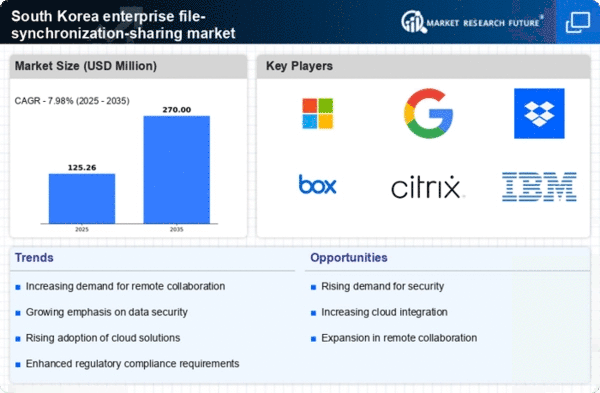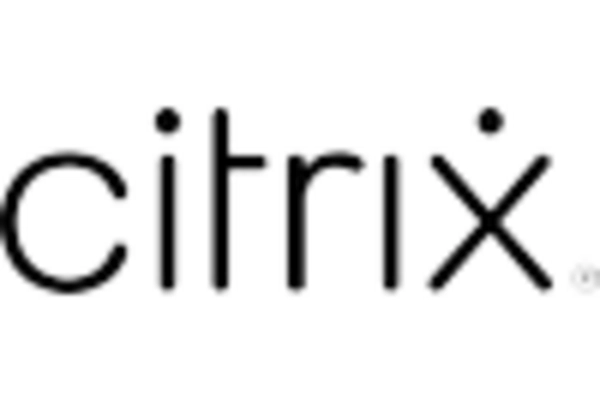Rising Demand for Remote Work Solutions
The enterprise file-synchronization-sharing market in South Korea experiences a notable surge in demand for remote work solutions. As organizations increasingly adopt flexible work arrangements, the need for secure and efficient file-sharing systems becomes paramount. According to recent data, approximately 70% of South Korean companies have implemented remote work policies, driving the necessity for robust synchronization tools. This trend indicates a shift towards digital collaboration, where employees require seamless access to files from various locations. Consequently, vendors in the enterprise file-synchronization-sharing market are likely to enhance their offerings to cater to this growing demand, ensuring that businesses can maintain productivity and collaboration regardless of physical location.
Growing Importance of Collaboration Tools
The enterprise file-synchronization-sharing market in South Korea is increasingly driven by the growing importance of collaboration tools. As businesses recognize the value of teamwork and collective productivity, the demand for integrated file-sharing solutions that facilitate collaboration is on the rise. Recent studies indicate that organizations utilizing collaborative tools experience a 30% increase in project efficiency. This trend suggests that companies are prioritizing platforms that allow for real-time editing, commenting, and sharing of files among team members. Consequently, vendors in the enterprise file-synchronization-sharing market are likely to focus on enhancing collaborative features to meet the evolving needs of their clients.
Regulatory Compliance and Data Governance
In South Korea, the enterprise file-synchronization-sharing market is significantly influenced by stringent regulatory compliance and data governance requirements. Organizations are increasingly required to adhere to laws such as the Personal Information Protection Act (PIPA), which mandates strict data handling and sharing protocols. This regulatory landscape compels businesses to invest in secure file-sharing solutions that ensure compliance while protecting sensitive information. As a result, the market is likely to see a rise in demand for solutions that offer advanced security features, audit trails, and data encryption. The emphasis on compliance not only safeguards organizations from potential legal repercussions but also enhances their reputation in the eyes of consumers.
Technological Advancements in File Sharing
Technological advancements play a crucial role in shaping the enterprise file-synchronization-sharing market in South Korea. Innovations such as blockchain technology and enhanced encryption methods are transforming how organizations manage and share files. These advancements provide improved security and transparency, which are essential in today's digital landscape. For instance, the integration of blockchain can offer immutable records of file transactions, thereby increasing trust among users. As South Korean enterprises seek to leverage these technologies, the market is expected to witness a shift towards more sophisticated solutions that not only meet current demands but also anticipate future challenges in file sharing.
Increased Investment in Digital Transformation
In South Korea, the enterprise file-synchronization-sharing market is witnessing increased investment in digital transformation initiatives. Organizations are recognizing the necessity of modernizing their IT infrastructure to remain competitive in a rapidly evolving business environment. This shift is reflected in the allocation of substantial budgets towards digital tools, with reports indicating that companies are expected to invest over $10 billion in digital transformation by 2026. Such investments are likely to encompass advanced file-sharing solutions that enhance operational efficiency and data management. As businesses embark on this digital journey, the enterprise file-synchronization-sharing market is poised for growth, driven by the demand for innovative and effective file management solutions.
















